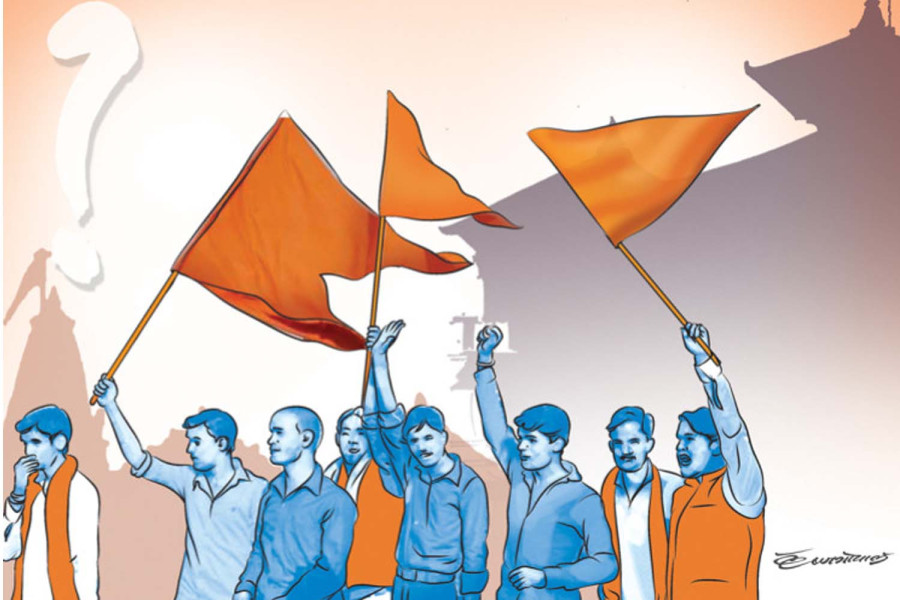Editorial
Clamour for Hindu state
A political ideology that favours nativism and monoculturalism has no place in a democracy.
As the promises of good governance, development and prosperity do not seem to attract voters anymore, parties old and now are looking to proffer new ones. Just a year into the new Parliament’s tenure, political parties already seem to have turned on the election mode, displaying their inner anxieties about what’s in store in 2027. The competition now seems to be for who can make a solid case for “Hindu Rashtra”, even while trying hard not to sound too regressive.
One such party that is touching on the idea of restoring Hindu Rashtra is the Nepali Congress. Although the Congress grouping publicly in its favour is still a fringe one, the same could have been said about the small group that called for republican Nepal in the mid-2000s. At that time, angry young leaders of the Congress, among other parties, were not considered influential enough to bring about a policy change. But then republican Nepal was eventually established. Around two decades later, second- and third-tier leaders are making a case for restoring Hindu Rashtra. That ‘fringe’ was at least 30 percent in the last Congress Mahasamiti meeting in 2018. This time, around two dozen influential leaders, including Shankar Bhandari, Pushpa Bhusal, Bhim Parajuli and Mukta Kumari Yadav, raised this issue at the central working committee on Thursday.
It is unclear whether the Congress Party will include it in the agenda of the Mahasamiti meeting this time. The top leadership is yet to show any big inclination to this idea, but it is certain to face more and more pressure from the group wanting to restore Nepal as a ‘Vaidik Sanatan Hindu state’ as the election months near. The mandate received by the Rastriya Prajatantra Party (RPP) and the Rastriya Swatantra Party (RSP) in the 2022 parliamentary elections has made the big political parties look for new ways to lure voters. But both the RPP and the RSP are harping on Hinduism, although their degrees of inclination are different. While the RPP has been unapologetic and unequivocal about its call for the restoration of Hindu Rashtra, the RSP has shown vague interest in restoring Hindu Rashtra and might put all its weight behind the idea if it gains traction closer to election time.
What is giving impetus to the apologists of Hindu Rashtra is the bold positions taken by Indian Prime Minister Narendra Modi and his Bharatiya Janata Party. The recent consecration of the Ram Lalla temple in Ayodhya, in Uttar Pradesh, considered the Modi government's masterstroke towards restoring a Hindu Rashtra in India, has emboldened some Nepali leaders to ride on the rising popularity of the idea. However, its apologists in Nepal often do not seem to be able to distinguish between Hinduism and Hindutva. The former is a spiritual quest or a way of life; the latter is a political project. As a Hindu-majority country, Nepal already has sensibilities of Hinduism, and that is fine as long as this way of life is not imposed on others. However, Hindu Rashtra is more akin to the political ideology of Hindutva, based on the idea of nativism and monoculturalism, and it has no place in a democracy.




 10.12°C Kathmandu
10.12°C Kathmandu













